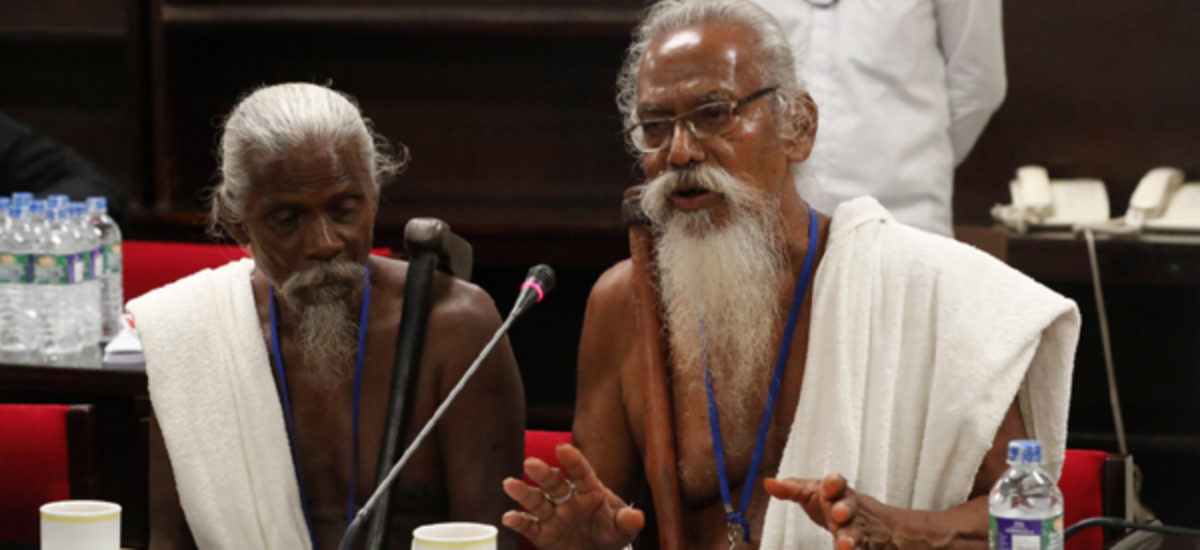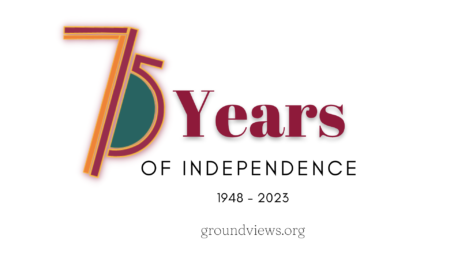Photograph Courtesy Parliment.lk
Despite the unprecedented socio-economic and political setbacks Sri Lanka is currently facing, the Government is making preparations to celebrate the country’s 75th Independence Day in grand style. Within this climate, however, there is notable emerging social discourse; including visible strands of dissent from various parties, as to whether the people of this country do have a legitimate social, economic and political environment to mark the 75th Independence Day in a celebratory manner. One of the loudest voices in this call comes from the Adivasi communities in Sri Lanka. Sri Lanka’s Adivasi community face constant threat to their livelihood due to the ill advised and ignorant actions of the public authorities and policy makers, at local, provincial and national levels. Therefore, it is worth listening to Adivasi communities to understand if others at large feel their aspirations and respect their unique identity and rights.
The question is whether the “Adivasi Communities” living all across the country, including but not limited to Uva, North Central, Eastern, Sabaragamuwa, and Northern provinces, are entitled to having a conducive environment that ensures the socio-economic and political landscape that allows them to enjoy the fundamental rights enshrined in Chapter III of the Constitution of the Democratic Republic of Sri Lanka. While there are numerous issues and challenges related to the rights of people in general, citizens belonging to the “Adivasi Communities”, and those who are willing to identify themselves as “Adivasi” face even more challenges and are considerably more vulnerable than other communities with regards to their citizenship in this country. This is an alarming situation that blatantly discriminates against the Adivasi people in Sri Lanka in various forms, whereas Article 12 (2) of the Constitution which states, “No citizen shall be discriminated against on the grounds of race, religion, language, caste, sex, political opinion, place of birth or any one of such grounds.”
The United Nations have internationally recognized the rights of indigenous people across the globe through the United Nations Declaration on the Rights of Indigenous Peoples (A/RES/61/295) with a strong urge for member states to provide effective mechanisms for prevention of, and redress for, inter alia, actions which have the aim or effect of depriving them of their ethnic identities, dispossessing them of their lands, territories or resources and any racial or ethnic discrimination against them.
Although Sri Lanka has voted in favour of the UN Declaration, the absence of a specific policy framework or legally binding instrument that explicitly recognizes the existence, identity and rights of “Adivasi” communities leave these indigenous communities vulnerable to suppression and discrimination. Further, none of the provisions of the United Nations Declaration on the Rights of Indigenous Peoples nor the provisions of the Indigenous and Tribal Peoples Convention, 1989 (No. 169) have been adopted within a domestic legal or policy framework. As a result, the short-sighted, arbitrary and at times intentionally discriminatory actions of both policymakers, officials of law enforcement authorities and administrators have further exacerbated the threats to the existence of the Adivasi communities in Sri Lanka.
This brief note is expected to provide a summary of core issues faced by Adivasi (indigenous) communities in Sri Lanka and present proposed policy interventions in addressing those issues.
Core Issues faced by Adivasi Communities in Sri Lanka
- Absence of formal constitutional or legislative recognition for persons representing different indigenous (Adivasi) communities in Sri Lanka. Such recognition should entail the assurance of the rights of the indigenous community.
- Absence of specific legislation that explicitly provides provisions for the protection and promotion of economic, social, cultural, civil and political rights of indigenous communities.
- Law enforcement authorities, without sensitivity towards the unique civil, political, socio-economic and cultural rights of Adivasi communities, mainly including their right to livelihood, conduct themselves in a manner that is in clear detriment to the community’s well-being and survival.
- As entry into forests has been prohibited, the livelihood of the Adivasi community has been affected. As a result, they have been lured into the micro finance debt trap, falling prey to aggressive loan collection techniques (e.g., daily harassment, public humiliation, social exclusion, etc.) and matters that affect their privacy.
- The absence of a robust and updated socio-economic profile of different Adivasi communities in various regions of the country has resulted in their lack of recognition, exclusion and marginalization; thereby, allowing for their continued discrimination and disenfranchisement from the Sri Lankan community at large.
- The lack of a grievance redress mechanism and fair hearings when the rights of Adivasi communities are infringed, together with weak community-led institutions to advocate for their rights, have inevitably put them at risk of being subject to injustices.
- Administrative decisions, at times potentially derived from political motives, inflict direct or indirect consequences on the entitlement of Adivasi communities to the freedom to enjoy and promote their own culture and to use their language, freedom of occupation and movement.
- A range of causes, including development plans and administrative decisions not sensitive towards the significance of protecting rights of Adivasi communities have resulted in endless hindrances preventing them from engaging in their customary livelihood means. For instance, there are frequent incidents of arresting and initiating legal action against members of Adivasi communities for engaging in livelihood activities, including fishing, harvesting bee honey, and engaging in Chena cultivation.
Suggestions for policy and practice-related reforms
- Introduce a draft bill in consultation with the Adivasi community and relevant stakeholders incorporating the unique features and requirements of the Adivasi community.
- Government should take necessary action to ratify the Indigenous and Tribal Peoples Convention, 1989 (ILO Convention 169) while formally acknowledging the commitment of the state to respect the provisions of the United Nations Declaration on the Rights of Indigenous Peoples.
- The government should take necessary action to review some of the existing legislations, including but not limited to the Fauna and Flora Protection Ordinance, Forest Ordinance, Coast Conservation Act and other laws and policies that unreasonably hinder the use of ancestral habitats of Adivasi communities and prevent them from engaging in their livelihood activities.
- It should be the responsibility of the relevant public authorities to ensure the effective implementation of such laws and proper regulation of human activities instead of imposing ad hoc regulator measures that undermine the fundamental rights of Adivasi communities and put their existence at stake.
- Government should appoint an “Independent Committee on the Rights of Adivasi Communities in Sri Lanka” with the mandate of conducting a comprehensive census of the socio-economic profile of the different existing groups of people who themselves are identified as part of the broader definition of “Adivasi Community” in Sri Lanka.
- Government should appoint a Parliamentary Sub-Committee under the most appropriate Sectoral Oversight Committee to review the emerging issues and challenges faced by different community groups belonging to the “Adivasi Community in Sri Lanka”. This Sub-Committee should refer to the reports presented by the “Independent Committee on the Rights of Adivasi Communities in Sri Lanka”
- The decision not to include “Adivasi Communities” as an ethnic group in the national census itself is an example of discrimination and exclusion, whereas the identities of indigenous people are globally acknowledged. Article 8(2)(a) of the United Nations Declaration on the Rights of Indigenous Peoples states that “Any action which has the aim or effect of depriving them of their integrity as distinct peoples, or of their cultural values or ethnic identities.” Thus, the government should, in all possible means, take appropriate affirmative action to ensure the recognition of Adivasi communities.
- District secretaries should request the officials in charge of district-level census and statistics to conduct district-level data-gathering processes to understand the spread of Adivasi communities across the country. The attitude of public officials and policymakers that perceive “Adivasi Communities” as insignificant should be changed.
- The Central Bank of Sri Lanka and other related financial and regulatory authorities should take steps to assess the impact of debt on the Adivasi communities due to microfinance, micro-credit and other forms of unregulated money lending activities. Additionally, authorities should take immediate action to prevent unauthorized persons and institutions from enticing Adivasi communities to become borrowers and subsequently lose their assets by way of selling their movable and immovable property to money lenders in settlement.
- The Ministry of land, in collaboration with district administrations and other concerned authorities, mainly including the Ministry of agriculture and wildlife & forest resources conservation (Department of Wildlife Conservation & Department of Forest Conservation), should review the ancestral heritage of Adivasi communities to land and cease arbitrary administrative decisions that deprive their right to land and access to water.
- Government should cease the ‘issues based’ approach in addressing emerging concerns of the existence of Adivasi communities and instead should demonstrate a political will to adopt a ‘policy based’ approach to convince those communities to see themselves as part of citizens of the land with due state’s recognition to their unique identity.
- The state should recognize the role of Adivasi communities as guardians of natural resources as opposed to perpetrators who destroy the same. Such intervention should prevent the increasing risk of assimilating them into other communities’ standard of living merely because Adivasi community members are fewer.


